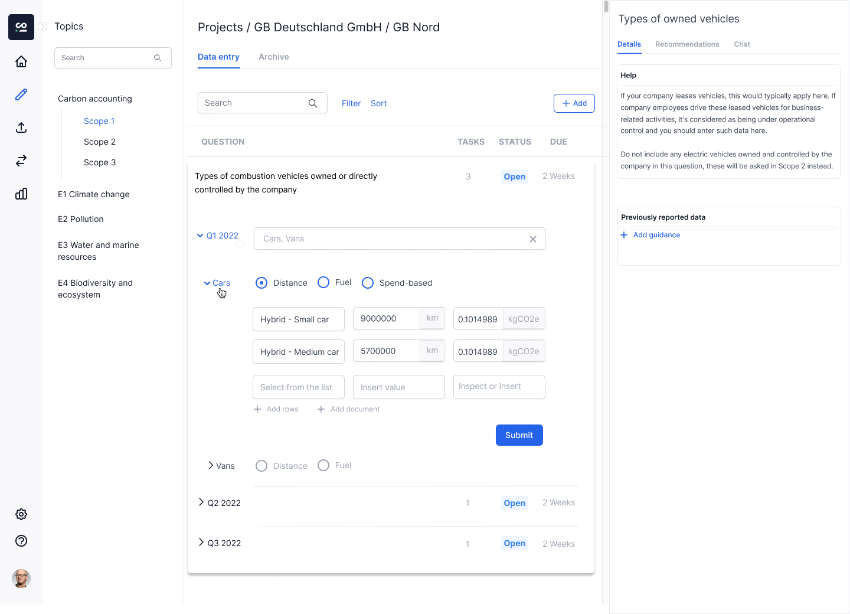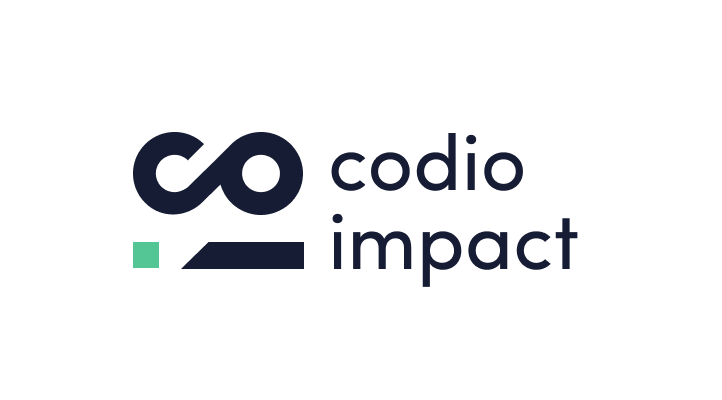Codio Impact automates the way companies manage and report environmental, social, governance (ESG) data, while remaining fully compliant with the newest regulation.
Interview with Sonja Radovic Paul, Co-founder & Managing Director of Codio Impact.
A brief description of the company and its activities.
Sonja Radovic Paul: Our mission at Codio Impact is to allow industrial companies to utilize non-financial data to improve its efficiency.
We developed a software that works in 3 general areas:
- Data collection and reporting: Our platform allows users to gather data for any regulatory reporting requirement, such as CSRD/ESRS, GRI, DNK, carbon accounting, EU Taxonomy, double materiality assessment, and more. The process is compliant with regulatory standards and customizable to fit the unique needs of each organization.
- Data Benchmarking: Our software enables companies to compare their performance across various internal metrics, such as different subsidiaries, locations, and projects, as well as against external industry peers. This comprehensive benchmarking ensures organizations stay on track with their performance goals.
- Goal Setting: Users can set specific performance goals and identify areas for improvement. This feature empowers companies to strategically focus on enhancing their operations and sustainability efforts.
What are the main areas of activity of the company?
S.R.P: Our main activities are in the space of sustainability and corporate sustainability reporting; at this point, dozens of thousands of companies are preparing for European Sustainability Reporting Standards (ESRS). This is a challenging task as the ESRS requires over one thousand data points collected and reported in the next year – a task impossible to complete using standard tools. Our customers enjoy the simplicity and intuitiveness of software and are able to cut down time for compliant reporting by more than 80%. For this purpose, we utilize artificial intelligence – our data is reused and serves for many purposes other than a single export; it can help companies answer supplier requests, obtain certifications or get to a better benchmarking.
What’s the news about new products/services?
S.R.P: We are currently launching a double materiality assessment, which is fully done via platform and supported by artificial intelligence. Our newest product launch will allow for an audit-proof assessment, in line with the guidelines of relevant authorities and best practice.

What are the ranges of products/services?
S.R.P: Our software is designed to cater to the complexities of large organizations, offering extensive customization and scalability. With over five levels of data aggregation, companies can be fully onboarded onto our platform, mirroring their financial accounting structures. This flexibility allows organizations to manage data collection for specific projects (e.g., BREEAM/LEED certification at the asset level) while maintaining consolidated reporting for broader initiatives (e.g., EcoVadis certification at the group level). The user-friendly customization ensures that our services are accessible and effective for all users.
What is the state of the market where you are currently active?
S.R.P: Sustainability data in private markets is scarce, inaccurate and disbursed throughout the organization. While we have some bright examples of public markets data, private sector is lagging behind for a multitude of reasons: employee culture, complicated regulation, complex corporate structures, lack of resources, and many more. Especially in industrial companies, which are our primary customers: waste, utilities and construction companies that are having the most significant impact but are forgotten from ESG software tools around the world.
What can you tell us about market trends?
S.R.P: There is an urgent and growing need to address ESG (environmental, social, and governance) issues, driven by both regulatory requirements and market pressures. Companies that perform poorly on ESG metrics have lower ratings, prices of their products and services are affected and often face a declining value. Those staying ahead will lead the market and the laggards will need to adapt as soon as possible. At this point, especially with supply chains being thoroughly inspected for compliance, we do not see any space for avoiding to perform regular inspections of your performance.

What are the most innovative products/services marketed?
S.R.P: At this point, there is a lot of exciting news around carbon capture technologies, zero-carbon cement, as well as many innovations in regard to particular parts of sustainable performance: different filters for wastewaters, use of satellites for carbon footprint, waste imagery and so on. I believe we are in a great position to innovate and change the course of climate change, and there are many smart people working tirelessly on that.
What estimations do you have for 2024?
S.R.P: The urgency to comply with European regulations will intensify in 2024, as global regulators continue to introduce new measures and disclosure requirements. The scope of mandatory reporting will expand, necessitating robust systems and processes for organizations to stay ahead. The years 2024 and 2025 will be critical for companies to adapt and implement effective strategies to maintain regulatory compliance and achieve sustainability goals.

